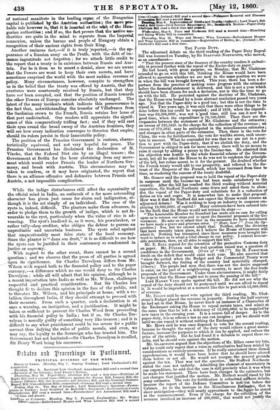While the indigo disturbances still affect the equanimity of the
official mind in India, an outbreak of a far more astounding character has given just cause for alarm and indignation, al- though it is the ad simply of an individual. The ease of the ryots is, indeed, difficult. The planters make them advances, in order to pledge them to the growth of indigo, which is not fa- vourable to the ryot, particularly when the value of rice is ad-. vancing,. The ryot's landlord is, as it were, his pawnbroker, or rather tally-shop ereditor, who obliges the debtor to pursue an unprofitable and uncertain business. The ryots rebel against that unquestionably most false state of the local economy. Since the planter is " dans son droit," it is as difficult to see how the ryots can be justified in their contumacy as condemned in justice or ecromy. With regard to the other event, there cannot be a second questiow; and we observe that the press of all parties is agreed upon its significance. Sir Charles Trevelyan differs from Mr. Wilson with regard both to the financial policy and to the paper currency,—a difference which no one would deny to Sir Charles Trevelyan; while all will admit that his opinion, although he is a recent importation into India as well as Mr. Wilson, challenges respectful and practical consideration. But Sir Charles has thought fit to declare this opinion in the face of the public, and to threaten Mr. Wilson, and his principals at home, with a re- bellion throughout India, if they should attempt to proceed with their measure. From such a quarter, such a declaration is at once a warning, an instigation, and a justification. It might be taken as sufficient to prevent Sir Charles Wood from proceeding with his financial policy in India ; but if so, Sir Charles Tre- velyan is morally guilty of something very like treason ; and it is difficult to say what punishment could be too severe for a public servant thus defying the rules of public morals, and even, we may say, the loyalty to the Sovereign who has trusted him. The Government has not hesitated—Sir Charles Trevelyan is recalled, Sir Henry Ward being his successor.


























 Previous page
Previous page